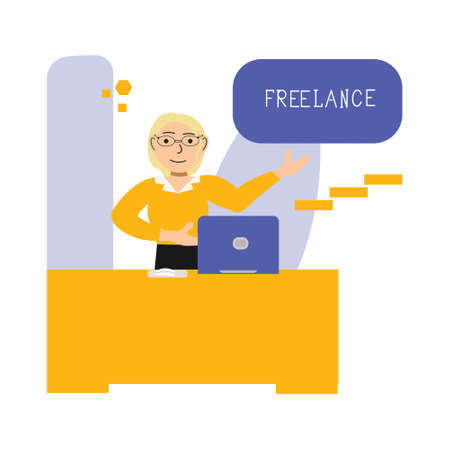Introduction: The Landscape of Freelancing in the UK
The UK’s workforce has undergone a profound transformation in recent years, with freelancing and gig work emerging as prominent features of the modern employment landscape. The gig economy—encompassing freelancers, independent contractors, and platform-based workers—now constitutes a significant and growing segment of British labour. Recent studies indicate that millions of people across the country are engaging in freelance work, whether as their primary source of income or as a supplementary activity alongside traditional employment. This shift reflects broader changes in how individuals approach their careers, seeking greater autonomy, flexibility, and variety in their working lives. At the same time, it raises important questions about wellbeing and work-life balance for those navigating the unique challenges and opportunities that freelancing within the UK’s gig economy presents.
2. Defining Wellbeing and Work-Life Balance for UK Freelancers
Understanding wellbeing and work-life balance is crucial for freelancers operating within the UKs gig economy. While these concepts are universally important, their local meaning is shaped by distinct cultural expectations, social norms, and legal frameworks prevalent in the United Kingdom.
Wellbeing: A Holistic View for UK Freelancers
In the UK context, freelancer wellbeing is not limited to physical health; it encompasses mental health, financial stability, social connectivity, and personal fulfilment. The British approach often emphasises “keeping a stiff upper lip,” yet recent societal shifts have led to greater openness about mental health and the importance of support networks. Freelancers must proactively manage their own wellbeing, often without access to traditional workplace benefits or structured support systems available to employees.
Cultural Expectations and Local Norms
The British workforce values both productivity and personal time. There’s a growing recognition of “presenteeism” being counterproductive, particularly post-pandemic. Flexible working arrangements are culturally appreciated, but there remains an undercurrent of expectation for reliability and professionalism—traits especially vital for freelancers looking to build trust with clients. Additionally, the concept of “down tools”—the right to disconnect after work hours—is gaining traction in discussions around work-life balance.
Defining Work-Life Balance for Freelancers
Work-life balance in the UK is increasingly seen as essential rather than a luxury. Unlike traditional employees who may have set hours or legal entitlements like paid leave, freelancers must self-regulate their workload and downtime. This can be both empowering and challenging in the absence of external boundaries.
| Aspect | UK Freelancer Experience | Traditional Employee Experience |
|---|---|---|
| Working Hours | Flexible but unpredictable; self-managed | Generally fixed; regulated by law |
| Mental Health Support | Self-sought (private or NHS resources) | Often employer-provided schemes/EAPs |
| Pension & Benefits | Must arrange personally (e.g., private pension) | Employer contributions/benefits standard |
| Right to Disconnect | No formal protection—self-imposed boundaries needed | Some protections emerging via policy/discussion |
| Social Interaction | Limited; requires proactive networking/community engagement | Regular via workplace environment |
Navigating Unique Challenges as a UK Freelancer
Cultural nuances, such as the British preference for politeness and discretion, also affect how freelancers communicate boundaries with clients regarding availability or workloads. Navigating these expectations while safeguarding one’s own wellbeing is a delicate balancing act that requires assertiveness and strategic planning. Understanding these local nuances helps UK freelancers set realistic expectations for themselves—and their clients—while advocating for better wellbeing practices within the gig economy framework.

3. Legal Protections and Gaps for Freelancer Wellbeing
Freelancers in the UK’s gig economy occupy a unique legal position, falling outside many of the traditional employment protections enjoyed by full-time employees. The main legislative frameworks—such as the Employment Rights Act 1996 and the Health and Safety at Work Act 1974—provide comprehensive rights for employees but leave significant gaps for those classified as self-employed or “workers.” This legal ambiguity has a direct impact on the wellbeing and work-life balance of freelancers, who often lack access to paid holiday, statutory sick pay, and redundancy rights.
UK Legal Frameworks: What Exists?
While recent years have seen some progress, such as the Taylor Review of Modern Working Practices and subsequent changes in worker status definitions, most freelancers are still only entitled to basic protections. These include the right to be paid at least the National Minimum Wage (if classified as a ‘worker’), protection against discrimination under the Equality Act 2010, and limited health and safety provisions when working on client premises. However, the majority of gig economy platforms classify their workers as independent contractors, thereby excluding them from these entitlements.
Mental Health Protections: A Notable Gap
The absence of robust mental health protections is particularly concerning. Unlike employees, freelancers do not have a statutory right to reasonable adjustments for mental health conditions or access to employer-provided wellbeing programmes. This leaves many gig workers vulnerable to stress, isolation, and burnout without formal recourse or support systems. The lack of a stable income also contributes significantly to financial anxiety, further impacting mental health.
Calls for Reform
Legal practitioners and advocacy groups continue to press for reforms that would close these gaps. Recommendations include extending core employment rights—such as sick pay and parental leave—to all gig workers, regardless of contractual status. There is also growing support for clearer definitions of employment status and mandatory wellbeing support from platforms operating in the UK. Until such measures are implemented, however, freelancers must navigate these legal uncertainties largely unaided, with considerable implications for their overall wellbeing and work-life balance.
4. Common Challenges: Financial Instability and Social Isolation
Freelancers in the UK’s gig economy face a unique set of challenges that can significantly impact their wellbeing and work-life balance. Two of the most pressing issues are financial instability and social isolation, both of which have far-reaching consequences on everyday life. Below, we analyse these typical barriers and their implications.
Financial Instability
Unlike traditional employees, gig workers often contend with unpredictable earnings. This irregular income makes budgeting difficult and may cause stress when trying to meet monthly expenses. Furthermore, the lack of statutory benefits such as paid leave or sick pay exposes freelancers to additional financial risks if they are unable to work due to illness or personal emergencies.
| Challenge | Impact on Wellbeing |
|---|---|
| Irregular Income | Uncertainty in paying bills, increased anxiety, difficulty securing loans or mortgages |
| No Paid Leave | Lack of rest, increased risk of burnout, working through illness |
| Pension Issues | Lack of long-term financial security, insufficient retirement savings |
Pension and Long-Term Security Concerns
Pension provision is another significant worry for gig workers in the UK. Unlike employees who benefit from employer contributions under automatic enrolment schemes, freelancers must arrange their own pensions. Many either delay saving for retirement or contribute irregularly due to fluctuating income, putting their future financial security at risk.
Social Isolation Among Gig Workers
The nature of freelance work can also be isolating. Without a regular workplace or team environment, many gig workers report feelings of loneliness. This lack of daily interaction can negatively affect mental health and reduce opportunities for networking and professional support, making it harder to access advice or share experiences.
| Source of Isolation | Potential Consequences |
|---|---|
| Remote/solo working | Feelings of loneliness, increased stress levels |
| Lack of colleague support | Difficulties in problem-solving, limited emotional support |
Summary of Key Barriers
In summary, the typical barriers faced by UK gig economy workers—namely financial instability and social isolation—can seriously undermine both wellbeing and work-life balance. Addressing these challenges requires proactive planning and awareness from both freelancers themselves and policymakers looking to safeguard this vital segment of the workforce.
5. Practical Strategies for Achieving Work-Life Balance
For freelancers navigating the UK’s gig economy, achieving genuine work-life balance goes beyond time management—it requires a strategic approach rooted in both legal awareness and cultural understanding. Here are some practical, UK-specific strategies to support your wellbeing and professional longevity.
Setting Boundaries with Clients
Establishing clear boundaries is essential. In the UK, it’s both common and respected to set professional limits regarding availability and response times. Clearly state your working hours in contracts or onboarding emails, and don’t hesitate to remind clients of these boundaries if they attempt out-of-hours contact. Remember, under UK law, you have the right to define your own working patterns as a freelancer—exercise this right to protect your downtime.
Utilising Local Co-Working Spaces
Isolation is a frequent challenge for gig workers, but the UK boasts an ever-growing network of co-working spaces from London to Manchester and Edinburgh. These hubs not only provide reliable Wi-Fi and office amenities but also foster community and offer networking opportunities. Many local councils and libraries now host affordable or even free co-working days; take advantage of these to separate your home life from your work life, reducing domestic distractions and enhancing productivity.
Taking Advantage of Mental Health Resources
The conversation around mental health has gained significant traction in the UK, with numerous resources available for freelancers. Organisations such as Mind, Samaritans, and The Association of Independent Professionals and the Self-Employed (IPSE) offer tailored support ranging from helplines to workshops on stress management. Additionally, many local NHS trusts provide access to talking therapies which freelancers can self-refer to. Prioritising mental health isn’t just wise—it’s increasingly recognised as best practice within the UK freelance community.
Creating Your Personal Work-Life Balance Toolkit
By combining these practical strategies—assertive boundary setting, leveraging communal workspaces, and proactively seeking mental health support—you can cultivate a healthier work-life balance attuned to the realities of freelancing in the UK. Remember: maintaining wellbeing is not a luxury but a necessity for sustainable success in the modern gig economy.
6. Support Networks and Resources Available in the UK
Freelancers working within the UKs gig economy often face unique challenges when it comes to wellbeing and work-life balance. Fortunately, a range of support networks and resources exist specifically to address these needs and ensure freelancers are not left isolated.
Unions Representing Freelancers
Unlike traditional employment, freelance work can leave individuals without a collective voice. However, several unions in the UK now represent freelance workers across sectors. Notable examples include Community, which has a dedicated section for freelancers, and BECTU (part of Prospect), focusing on creative industries. These unions offer legal advice, contract reviews, advocacy on rights, and guidance on best practices for maintaining both wellbeing and professional standards.
Government-Backed Initiatives
The UK government recognises the importance of supporting self-employed professionals. Platforms such as GOV.UK’s Business Support Helpline provide tailored advice on everything from mental health to financial planning. Additionally, the Self-Employment Income Support Scheme (SEISS) and access to NHS mental health resources have been instrumental in helping freelancers navigate tough periods, especially during the pandemic.
Freelance Communities and Peer Groups
The power of peer support cannot be underestimated. UK-based online communities like Freelance Heroes, The Dots, and region-specific groups on social media offer spaces where freelancers can share experiences, seek advice, and form collaborations. Local co-working spaces often host meetups or workshops aimed at building resilience and fostering connections among independent workers, directly contributing to improved wellbeing and a balanced lifestyle.
Mental Health Helplines and Specialist Support
Mental health is a growing concern for many in precarious or isolated working arrangements. Charities such as MIND, Samaritans, and CALM (Campaign Against Living Miserably) offer helplines and resources that are accessible to anyone, including freelancers facing stress or burnout. There are also specialist services like The Film & TV Charity’s Support Line, which provides industry-specific mental health support for creatives.
Accessing These Resources
Navigating these networks starts with identifying your specific needs—be it legal advice, emotional support, or professional development. Memberships in unions or professional bodies often unlock additional benefits such as insurance schemes or training opportunities. For immediate concerns, helplines are available 24/7, ensuring that help is always at hand.
Towards a Supportive Ecosystem
The landscape of support for UK freelancers continues to evolve as their numbers grow. Proactive engagement with these networks not only bolsters individual wellbeing but also helps shape fairer working conditions across the gig economy. By utilising these resources, freelancers can build stronger foundations for both their personal lives and professional success.
7. Conclusion: Towards a Sustainable Freelance Workforce
In summary, the wellbeing and work-life balance of freelancers in the UK’s gig economy hinge on several crucial factors: robust legal protections, accessible mental health resources, clear contractual agreements, and a supportive professional community. As highlighted throughout this article, freelancers face unique challenges such as income insecurity, lack of statutory benefits, and blurred boundaries between work and personal life. Despite these obstacles, there is growing recognition—both from policymakers and within the sector itself—of the importance of fostering a resilient freelance workforce.
Looking forward, building a sustainable freelance culture in the UK demands collective action. Legislative reform should continue to address gaps in employment rights, ensuring fair pay and access to social protections for all self-employed workers. Industry bodies and trade unions must strengthen their advocacy efforts, offering guidance and creating networks where freelancers can share best practices and access peer support. Additionally, clients and platforms have a vital role to play by promoting ethical standards, timely payments, and transparent communication.
On an individual level, freelancers are encouraged to prioritise self-care, set healthy boundaries with clients, and seek ongoing professional development. Cultivating financial literacy and leveraging technology for workload management can also enhance autonomy and security.
The future of freelancing in the UK will be shaped by how effectively we balance flexibility with fairness. By embedding wellbeing at the heart of freelance work—and by working collaboratively across sectors—the gig economy can evolve into a space where independent professionals not only survive but truly thrive.

